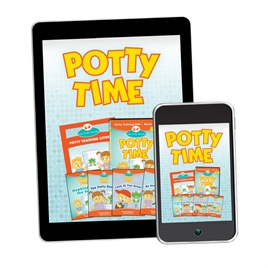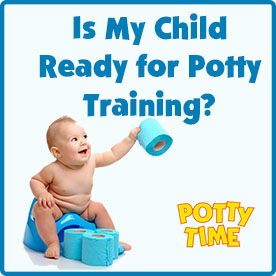Potty training is a huge milestone! Not only does it mean the eventual end to diapers and pull-ups, it means your little baby is taking some figurative steps towards being “so big!”
How do you know when your child is ready for potty training? It is about timing, not about age. Potty training is about physical, developmental and behavioral milestones. Children may be ready as early as 18 months and as late as 4 years. Typically it can takes longer for naps and nighttime training, most children can stay dry at night between ages 5 and 7. If you start too early, it might take longer to train your child.
Colleen Brunetti, MEd shares some signs that you can look for to help you decide if your child is ready to potty train.
Interest Level: One of the first signs that your child may be ready to potty train is when they demonstrate an interest in the process. Do they follow you into the bathroom, ask questions or point to the potty, or show other signs of interest?
Language Ability: Many experts say that a sign of readiness has to do with language – can a child communicate by asking questions and can they follow simple directions? While this may be one factor to consider, also remember that if you are using sign language in your home, odds are good that language is going to come sooner than if you had to wait for spoken words!
Does this mean your child who signs will be ready sooner than a child who does not? Maybe, or maybe not. It is certainly something to consider though, especially as sign language can offer such a boost in so many areas. Why not potty training as well?
Physical Development: Children will need to be able to sit long enough to go. Some children indicate they may be ready to train by expressing discomfort over soiled diapers. They may have more predictable times when they go, and they may begin staying dry in their diapers for increased periods of time.
Emotional Development: Children who are ready to potty train may exhibit signs that they are anxious for some independence (“I do it myself!”) However, they should also be in a stage where they are willing and wanting to please you. This means that even if all the other signs are there, but you are going through a stage of the “terrible twos”, or something similar, it may be best to hold off. Starting to potty train when a child is in a stage where they are constantly testing limits may result in frustration for all.
Upcoming Events: If your child is about to have a major life change (new sibling, new daycare, change in family members in the home, etc.) you may also want to wait a bit.
 Potty Time is a playful and positive approach to potty training. Emmy-nominated host Rachel Coleman teaches and inspires children to use the potty – and helps them sing, sign, and dance to celebrate their amazing bodies and potty time success. Potty Time is a perfect partner in potty training, working with any potty training method you choose. We believe children learn best by having fun, positive experiences through music, movement and fun!
Potty Time is a playful and positive approach to potty training. Emmy-nominated host Rachel Coleman teaches and inspires children to use the potty – and helps them sing, sign, and dance to celebrate their amazing bodies and potty time success. Potty Time is a perfect partner in potty training, working with any potty training method you choose. We believe children learn best by having fun, positive experiences through music, movement and fun!
We offer free resources to help you through your potty training journey. Tips, articles, potty training book ideas, and more!
Potty Time Sequence Cards: Teach the four steps of the potty process
Potty Time Success Chart: Keep track of your child’s success
Potty Time Certificate: Celebrate potty time success
Potty Time App: Get a call from Rachel, virtual stickers, and more!
No matter what, remember that all kids end up potty trained eventually! A child may be ready, and then need a break, or take months to train, or train in a weekend. Your first child is likely to train in a completely different way than your next child. Whatever the case – patience, love, and careful observation on your part are the real keys to success.

